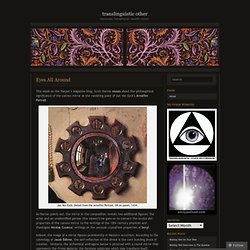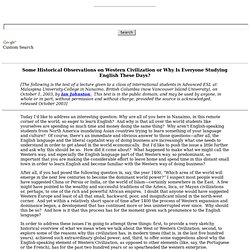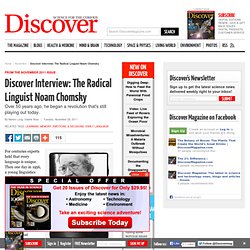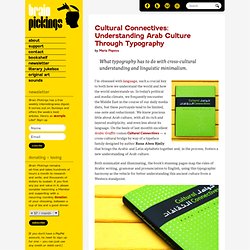

Discours - Revue de linguistique, psycholinguistique et informat.
Eyes All Around « translinguistic other. This week on the Harper’s Magazine blog, Scott Horton muses about the philosophical significance of the convex mirror at the vanishing point of Jan Van Eyck’s Arnolfini Portrait.

Jan Van Eyck. Detail from the Arnolfini Portrait. Oil on panel, 1434. As Horton points out, the mirror in the composition reveals two additional figures: the artist and an unidentified person (the viewer?) He goes on to connect the oculus dei properties of the convex mirror to the writings of the 15th century physicist and theologian Nicolas Cusanus‘ writings on the unusual crystalline properties of beryl. Indeed, the image of a mirror figures prominently in Western occultism. Illustration from S. It is an oft-romanticized fact that Van Eyck was an alchemist.
Does Your Language Shape How You Think? When these peculiarities of Guugu Yimithirr were uncovered, they inspired a large-scale research project into the language of space. And as it happens, Guugu Yimithirr is not a freak occurrence; languages that rely primarily on geographical coordinates are scattered around the world, from Polynesia to Mexico, from Namibia to Bali. For us, it might seem the height of absurdity for a dance teacher to say, “Now raise your north hand and move your south leg eastward.”
But the joke would be lost on some: the Canadian-American musicologist Colin McPhee, who spent several years on Bali in the 1930s, recalls a young boy who showed great talent for dancing. As there was no instructor in the child’s village, McPhee arranged for him to stay with a teacher in a different village. But when he came to check on the boy’s progress after a few days, he found the boy dejected and the teacher exasperated. So different languages certainly make us speak about space in very different ways.
Murray Gell-Mann on the ancestor of language. Are bilinguals' brains better? Thinking in foreign language makes decisions more rational. MONDE - Apprendre.TV - FLE - français langue étrangère: Éducation. English_as_a_grobal_lang_sample_ch. Why is Everyone Studying English? Custom Search Some Historical Observations on Western Civilization or Why Is Everyone Studying English These Days?

[The following is the text of a lecture given to a class of international students in Advanced ESL at Malaspina University-College in Nanaimo, British Columbia (now Vancouver Island University), on October 1, 2003, by Ian Johnston. This text is in the public domain, and may be used by anyone, in whole or in part, without permission and without charge, provided the source is acknowledged, released October 2003] Today I’d like to address an interesting question: Why are all of you here in Nanaimo, in this remote corner of the world, so eager to learn English?
And why is that all over the world students like yourselves are spending so much time and money doing the same thing? History of English (combined) Shakespeare: Original pronunciation. UD Sociolinguistica. Compound Linguistics. Joseph von Eichendorff: Wünschelrute > Magic Wand (Translation / Uebersetzung)
But the poetry now got lost in translation, you say?

Well, what else? But at least you knew your Robert Frost... Discover Interview: The Radical Linguist Noam Chomsky. For centuries experts held that every language is unique.

Then one day in 1956, a young linguistics professor gave a legendary presentation at the Symposium on Information Theory at MIT. He argued that every intelligible sentence conforms not only to the rules of its particular language but to a universal grammar that encompasses all languages. And rather than absorbing language from the environment and learning to communicate by imitation, children are born with the innate capacity to master language, a power imbued in our species by evolution itself. Almost overnight, linguists’ thinking began to shift. Avram Noam Chomsky was born in Philadelphia on December 7, 1928, to William Chomsky, a Hebrew scholar, and Elsie Simonofsky Chomsky, also a scholar and an author of children’s books. Études de communication - langages, information, médiations. Notes de la rédaction Comité de lecture du numéro 54 (Dossier) :Coordination : Ulrike Lune Riboni, Raphaële Bertho.

Cultural Connectives: Understanding Arab Culture Through Typography. By Maria Popova What typography has to do with cross-cultural understanding and linguistic minimalism.

I’m obsessed with language, such a crucial key to both how we understand the world and how the world understands us. In today’s political and media climate, we frequently encounter the Middle East in the course of our daily media diets, but these portrayals tend to be limited, one-note and reductionist. We know precious little about Arab culture, with all its rich and layered multiplicity, and even less about its language. On the heels of last month’s excellent Arabic Graffiti comes Cultural Connectives — a cross-cultural bridge by way of a typeface family designed by author Rana Abou Rjeily that brings the Arabic and Latin alphabets together and, in the process, fosters a new understanding of Arab culture. The book jacket unfolds into a beautiful poster of a timeless quote by Gibran Khalil Gibran, rendered in Arabic: Brain Pickings has a free weekly newsletter and people say it’s cool. « l’inconscient est structuré comme l’écriture chinoise »